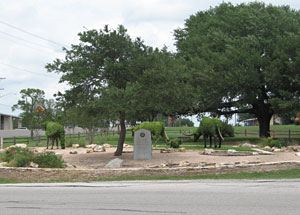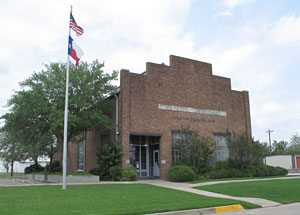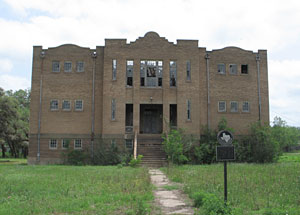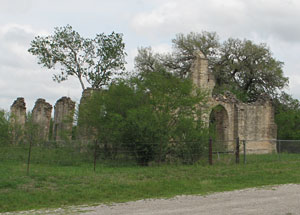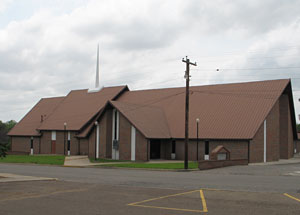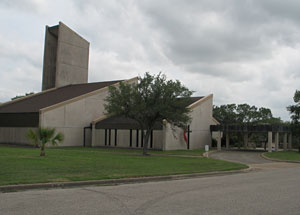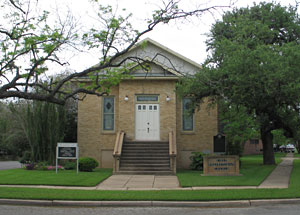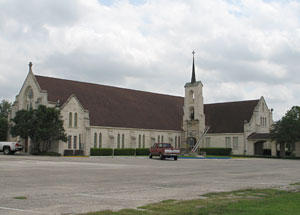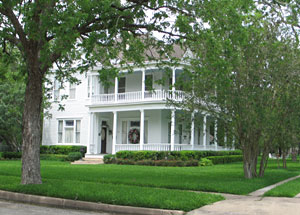 Yoakum is on the Lavaca-DeWitt county line. It was built on a league of land granted to John May by the government of Coahuila and Texas in 1835 and was used as a gathering ground for cattle to be driven up the Chisholm Trail. Yoakum did not grow until the construction of the San Antonio and Aransas Pass Railway in 1887. At this time a townsite was laid out and named after Benjamin F. Yoakum, vice president and general manager of the line. J. P. Jamieson built a store in 1887, and a post office opened that year. Railroad shops were located in Yoakum in 1888, and hundreds of people from surrounding towns found employment at its large roundhouse. The town was incorporated on May 13, 1889, with L. W. Thomas as mayor. By 1896 Yoakum had a cotton mill, three cotton gins, a compress, several churches, a bank, an ice factory, specialty and general stores, two weekly newspapers and one daily, a school system with 700 pupils, and a population of 3,000. By 1914 the number of residents had reached 7,500. In 1919 Carl Welhausen took over a small tanning company, the first of several in the city. The firm, known as Tex-Tan, a manufacturer of saddles, bridles, harnesses, belts, billfolds, and novelties, later became part of the Tandy Corporation. By 1940 other local industries included a creamery and a mattress factory. The first commercial tomatoes in the Yoakum area were grown in 1926. By the 1940s fifteen packing sheds in Yoakum shipped tomatoes north, and the town was sometimes called the tomato capital of south central Texas. In 1970 Yoakum had 170 businesses, including a leather-goods shop, a meat-packing plant, a food-processing plant, a metal workshop, a cannery, a newspaper, and two banks. Yoakum community services in 1989 included a nursing home, a hospital, a library, a municipal park, and a municipal airport. The Bluebonnet Youth Ranch, a home for neglected children, was founded by Charles Kvinta in 1968. The former home of J. K. Elkins and Mr. and Mrs. William Browning became the Yoakum Heritage Museum in 1982. The town had twenty-one churches of ten denominations. Among them is St. Joseph's Catholic Church, which celebrated its centennial in 1969. The First Baptist and First Methodist churches were built in 1889. Yoakum is a division point for the railway and also the site of a Texas highway department office. Since 1960 the town has sponsored an annual wildflower trail in the spring, which includes a guided tour and wildflower art exhibits. The May Tom-Tom Festival, which first publicized the tomato business, began in 1928, was suspended for five years in World War II, and resumed in 1946. The annual event now celebrates the local leather industry and is called the Leather Tom-Tom Festival. A local Youth Rodeo is held each July. The population of Yoakum, listed as 4,733 in 1940, grew steadily throughout the next four decades. In 1984 it reached 6,148, with 3,283 in Lavaca County and 2,325 in DeWitt County. In 1990 the population was 5,611.
Yoakum is on the Lavaca-DeWitt county line. It was built on a league of land granted to John May by the government of Coahuila and Texas in 1835 and was used as a gathering ground for cattle to be driven up the Chisholm Trail. Yoakum did not grow until the construction of the San Antonio and Aransas Pass Railway in 1887. At this time a townsite was laid out and named after Benjamin F. Yoakum, vice president and general manager of the line. J. P. Jamieson built a store in 1887, and a post office opened that year. Railroad shops were located in Yoakum in 1888, and hundreds of people from surrounding towns found employment at its large roundhouse. The town was incorporated on May 13, 1889, with L. W. Thomas as mayor. By 1896 Yoakum had a cotton mill, three cotton gins, a compress, several churches, a bank, an ice factory, specialty and general stores, two weekly newspapers and one daily, a school system with 700 pupils, and a population of 3,000. By 1914 the number of residents had reached 7,500. In 1919 Carl Welhausen took over a small tanning company, the first of several in the city. The firm, known as Tex-Tan, a manufacturer of saddles, bridles, harnesses, belts, billfolds, and novelties, later became part of the Tandy Corporation. By 1940 other local industries included a creamery and a mattress factory. The first commercial tomatoes in the Yoakum area were grown in 1926. By the 1940s fifteen packing sheds in Yoakum shipped tomatoes north, and the town was sometimes called the tomato capital of south central Texas. In 1970 Yoakum had 170 businesses, including a leather-goods shop, a meat-packing plant, a food-processing plant, a metal workshop, a cannery, a newspaper, and two banks. Yoakum community services in 1989 included a nursing home, a hospital, a library, a municipal park, and a municipal airport. The Bluebonnet Youth Ranch, a home for neglected children, was founded by Charles Kvinta in 1968. The former home of J. K. Elkins and Mr. and Mrs. William Browning became the Yoakum Heritage Museum in 1982. The town had twenty-one churches of ten denominations. Among them is St. Joseph's Catholic Church, which celebrated its centennial in 1969. The First Baptist and First Methodist churches were built in 1889. Yoakum is a division point for the railway and also the site of a Texas highway department office. Since 1960 the town has sponsored an annual wildflower trail in the spring, which includes a guided tour and wildflower art exhibits. The May Tom-Tom Festival, which first publicized the tomato business, began in 1928, was suspended for five years in World War II, and resumed in 1946. The annual event now celebrates the local leather industry and is called the Leather Tom-Tom Festival. A local Youth Rodeo is held each July. The population of Yoakum, listed as 4,733 in 1940, grew steadily throughout the next four decades. In 1984 it reached 6,148, with 3,283 in Lavaca County and 2,325 in DeWitt County. In 1990 the population was 5,611.
BIBLIOGRAPHY: Paul C. Boethel, The History of Lavaca County (San Antonio: Naylor, 1936; rev. ed., Austin: Von Boeckmann-Jones, 1959). Yoakum Sesquicentennial Book Committee, Yoakum Community (Dallas: Curtis, 1988).
Mary M. Orozco-Vallejo
Place cursor on postcard of Yoakum's Grand Avenue to see another view.
1893 Yoakum Businesses and City Officials
| Yoakum Weekly Herald Dec 17, 1908 FIFTEEN YEARS AGOThe Herald is in receipt of a miniature directory sent to us by some one in Columbus, Texas. We can’t just say who was the donor and the only thing we know is that it came in an envelope with the Colorado Citizen return on it, which shows I.G. STAFFORD, publisher. The directory was gotten up by WILLIAMS & CO. and printed by the old Yoakum Graphic with W.A. MAIR, editor and proprietor and was issued in 1893. We reproducing the business portion of the directory to show the people of Yoakum and surrounding country what vast changes have taken place in a little more than a decade. On the inside cover page appears an ad for the Yoakum opera house with B.P. STEPHENSON proprietor and manager. Mr. STEPHENSON was a cotton buyer and dealer in general merchandise. The next page gave a brief description of Yoakum with a small population though only six years old, and her location with the flattering prospects of her fast becoming a city. J.D. MONTGOMERY, attorney-at-law and Joe LEVY, justice of the peace. These gentlemen were also in the real estate and insurance business. |
“Large trees from little acorns grow” are the headlines in the ad of FINK & RADER, lumber dealers. Grand Avenue Pharmacy, J.M. CLARK proprietor and he was also in the stationary business. Mrs. K. MCCOWAN millinery and dressmaking. Palace Barber Shop, D.F. STREETER, proprietor.
City Directory: Mayor, J.D. MONGOMERY; attorney, J.M. GREEN; secretary, M.G. RANNEY; treasurer, A.W. TURNER; assessor and collector, J.G. DYAS, C.F. SCHAEFFER, H. TRIBBLE, H.J. PRAUSE, Joe LEVY and J.S. SCHRIMSCHER. Lavaca County Officers: County Judge, P.H. GREEN; county attorney, J.P. ELLIS; county clerk, John BUCHANAN; Sheriff, John F. HOUCHINS; treasurer, A.B. DEVALL; assessor, R.D. ZUMWALT, collector, B.F. CULPEPPER; surveyor, H.H. RUSSELL. Commissioners: No 1, 5, and 8, H.M. MEYER; No 2 and 6, A. GLECKLER; NO 3 and 7 , J.D. A. MEYER; No 4, J.M. WALDROP. DeWitt County Officers: Judge Ed KOENIG; attorney, S.C. LACKEY; clerk, J.P. BAKER; collector, W.H. GRAHAM; treasurer, H.E. DAHLMAN; assessor, Wm. GRAFTON; surveyor, G.H. SCHLEICHER; sheriff, Thos. M. STELL; Commissioners: Precinct No 1, J.P. WRIGHT; No 2, W.J. SIMPSON; No 3, B.R. BURROW; No 4 , John JUNKER. The postmaster for Yoakum was E. MULLEN; H.C BRANDT & SON , dealer in gents furnishings; WEATHERLY BROS., grocery dealers. |
The following are the pastors of the different churches: Baptist, Rev. M.C. WILLIAMS: Presbyterian, Rev. T.A. LEACH; Episcopal, Rev. HUDWON; Methodist, Rev. J.P. RODGERS, Sabbath School, T.M. DODD, Supt.
Yoakum Improvement Co., J.G. BLANKS, proprietor and also dealer in real estate; FISHER & ARLITT, merchant tailors; J. MCFARLAND, dealer in stationary and holiday goods; BISMARK SALOON, A. STOERMER, proprietor; Wm. LEHMS, first class meat market; Henry W. NAGEL, hardware dealer; L. LEVYTANSKY, dealer in jewelry and optical goods; HORSE SHOE SALOON, WHITTINGTON & HOUCHINS, proprietors; the oldest paper published in Yoakum, the Yoakum Graphic, W.A. MAIR, proprietor; M.E. GEBERT, dealer in general merchandise; LONE STAR SALOON, C.M. KEEPERS & CO., proprietors; Yoakum Weekly Times, the official organ of the city, W.L. JOHNSTON, proprietor; Grand Avenue Drug Store, R.J. FIELDER, proprietor; Red Light Saloon, T.G. GRADY, proprietor; Bank Saloon, John GLAZIER, proprietor; Private Boarding House, Mrs. TERRY & JETTON, proprietor. In the headlines of the lumber company of A. GILMER he gave the citizens of Yoakum good advice by saying build your home in Yoakum. The High School faculty was as follows: G.D. SCOTT, superintendent; J. CHERRY, first assistant; Miss Pearl DARBY, fifth grade; Miss Venice MCDADE, fourth grade; Miss Bertie SEARCY, third grade; Miss Leigh TOLLESON, second grade; Miss Clemmie BOOONE, first grade; Mrs. P.B. THOMASON, West End School; J.D. MONTGOMERY, chairman of school board and Joe LEVY, secretary. |

